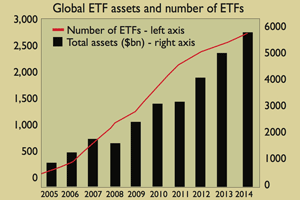
Exchange-traded funds (ETFs) are the “greatest marketing innovation of the 21st century”, says Jack Bogle, founder of investment firm Vanguard, interviewed in the FT. But whether they are the “greatest investment innovation” remains to be seen. “I do not believe [they are]; I think [they] will hurt returns for investors.”
Bogle is well-known for his opposition to ETFs, which are one of the fastest-growing parts of the investment industry. That may sound surprising, given that ETFs are generally associated with low costs and indexing (tracking an index such as the FTSE 100 instead of trying to beat the market) – exactly the principles on which Bogle created Vanguard 40 years ago.
Yet the reasons why many investors now favour ETFs over traditional index funds – the ability to trade throughout the day, the extensive range of sector and thematic ETFs, and the growing number of ‘smart beta’ ETFs that replicate specific strategies rather than following a simple index – are exactly the reason why Bogle dislikes them. He believes that ETFs lead investors to trade too much and encourage them to abandon sensible asset allocation for unproven strategies (he calls smart beta ETFs the “fruit and nut fringe”).
Bogle’s concerns meant that Vanguard was slow to embrace ETFs. It launched its first one in 2001 after Bogle stood down as chief executive, more than ten years after ETFs initially appeared in Canada. This gave rivals such as iShares (now owned by BlackRock) and State Street’s SPDRs range a head start.
Yet Vanguard is now catching up: with around $430bn in US-listed ETFs, it’s neck and neck with State Street in the American market (BlackRock remains some way ahead with over $750bn). That’s still less than a sixth of Vanguard’s $3trn in total assets, but the trend is clear. Whether Bogle approves of ETFs or not, Vanguard’s clients increasingly do.